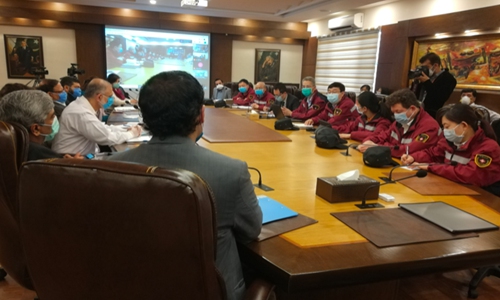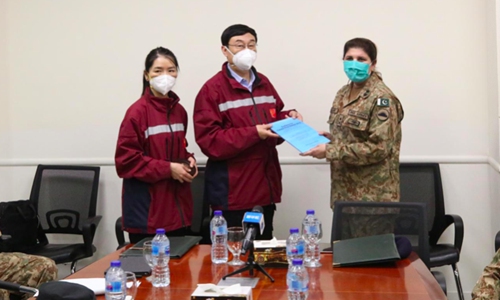HOME >> CHINA
Chinese medical team sent to Pakistan recommends more tests, epidemiological investigations
By Bai Yunyi and Fan Lingzhi Source:Global Times Published: 2020/4/3 15:52:01

Chinese medical aid team exchanged experiences in fighting the COVID-19 with local health authorities and medical workers in Pakistan. Photo: Courtesy of Ma Minghui

A hospital director in Pakistan presents a hospital badge to the leader of Chinese medical aid team in Pakistan. Courtesy of Ma Minghui
Chinese medical experts sent to aid Pakistan in its fight against COVID-19 have recommended the country to test as many people as it can and conduct epidemiological investigations to curb the spread of the virus.
"The medical resources in Pakistan are very limited. If the virus spreads further, the country's medical system could be paralyzed," said Ma Minghui, leader of China's medical aid team to Pakistan.
Ma is also the deputy head of the Epidemic Prevention and Control Group in Northwest China's Xinjiang Uygur Autonomous Region. He told the Global Times that the medical team in Pakistan consists of eight members including an epidemiologist, respiratory specialist, experts in treating critically-ill patients and nursing specialists.

Chinese medical aid team in shares the experiences in fighting the COVID-19 at a military hospital in Pakistan. Photo: Courtesy of Ma Minghui
Most of them have worked on the epidemic prevention frontlines in Xinjiang and have a wealth of practical experience. The group has exchanged opinions with Pakistan's health department, institutions and hospitals in Islamabad. The team will later visit Lahore and Karachi, two of the country's hardest-hit cities.
Ma told the Global Times that they have suggested Pakistan get more people tested for the novel coronavirus and implement early diagnosis, early isolation and early treatment measures. The team will also assist Pakistan in carrying out medical training and standardizing the country's epidemic prevention, control and treatment programs.
"Our strongest recommendation for them is that preventive measures should be put in place now and they need to make virus containment the top priority. Treatment is important but it should come after prevention and control efforts," Ma said.
He explained that this is "because local health officials told us that there are only 30, 000 to 40, 000 hospital beds in Pakistan. However, more than 2, 000 confirmed cases have been reported with more than 10, 000 suspected cases. Therefore, if the virus spreads further, Pakistan's medical resources will collapse quickly and lead to serious consequences."
Ma said this opinion was echoed by the Pakistani side.
In terms of medical supplies, Ma told the Global Times that currently Pakistan does not have the ability to produce its own nucleic acid test kits. A majority of test kits have been donated by China, with the rest coming from Japan, South Korea and the European Union. However, there are still not enough to meet actual demand. In the future, Pakistan will need to import more to fill the gap.
As for laboratories that have the capacity to do testing for the novel coronavirus, there are more than 10 military laboratories and more than 40 local laboratories in the country but even these will not be able to meet demand.
"The lack of testing kits and capabilities hinder the efforts to expand the scope of detection for coronavirus," Ma said.
After learning of Pakistan's shortage in medical supplies, Ma and his colleagues brought a large quantity of supplies. They arrived in Islamabad on the afternoon of March 28.
"Except for a few rows of seats for us, the plane's cabin and cargo compartment were filled with medical supplies, such as respirators, ECG monitors, testing kits, protective suits, facial masks and disposable medical supplies."
This is the second batch of medical supplies donated by Xinjiang to Pakistan. On March 27, China temporarily opened the Khunjerab Pass on the China-Pakistan border in Xinjiang to transport urgent medical supplies to Pakistan.
China has provided 2 million sets of personal protective equipment to Pakistan, China's Ambassador to Pakistan Yao Jing told media. Yao said that China will also provide 200 respirators to Pakistan and increase activities to exchange experience in fighting COVID-19 with Pakistan.
Currently, Pakistan is the country that has received the most donations from China.
Four recommendations
Ma told the Global Times that the awareness and expertise in detecting and treating coronavirus patients among Pakistani medical workers still need improvement.
"During a video conference with the country's medical workers, they brought up many questions regarding the problems they encounter while working, ranging from diagnosing the disease to the use of drugs and treatment of critically ill patients. Pakistan has decided to revise their diagnosis and treatment plans according to our suggestions," he said.
What concerns Ma and his colleagues the most has been the lack of self-protection awareness among medical workers in Pakistan. Due to the shortage in protective materials, the protective behaviors of medical workers needs to be strictly regulated to ensure the health and safety of frontline doctors and nurses, he said.
Considering the multiple challenges faced by Pakistan in fighting COVID-19, China's expert group provided four core recommendations for Pakistan.
"The first is to test more people for coronavirus and the more than 10,000 suspected cases should be tested immediately. The enforcement of early discovery, early diagnosis, early isolation and early treatment are necessary," Ma said.
"We also suggest that Pakistan increase the number of testing sites and improve the 'accessibility' of testing sites so that people can know where to go for testing. Right now, they only test certain special groups, but have not started large-scale population testing."
The second suggestion is to strengthen epidemiological investigation efforts in order to locate all the close contacts of those infected so they may undergo medical observation, which will help cut off transmission routes.
The third suggestion is that Pakistan should carry out large-scale social mobilization, launch a national emergency plan, keep locals updated on the epidemic situation and impress on the public the seriousness of the disease and encourage everyone to participate in epidemic prevention work.
Ma told the Global Times that that the above mentioned three recommendations are aimed at reducing the number of new cases in Pakistan.
"We have told Pakistan very frankly that the advantages of China's social system, organization and social mobilization capabilities are hard to replicate in other countries. When medical resources dried up in Wuhan, Hubei Province, we supported the city from all over the country with more than 40,000 medical staff being dispatched. We were able to build the makeshift Fancang Hospital, Huoshenshan Hospital and Leishenshan Hospital in a short period of time to treat patients. However, this is not something easily realized in most countries, so it's important to be aware of the necessity to curb the spread of the virus at an early stage."
Ma said that the Chinese medical team will assist Pakistan in medical training, and they have also suggested that Pakistan should coordinate the work of experts, medical personnel, fever clinics, designated hospitals, intensive care units, protective materials and technical reserves.
"Xinjiang is a core area of the Silk Road Economic Belt, a window of China's westward opening-up and an important hub of the China-Pakistan Economic Corridor. Pakistan is China's iron brother. China and Pakistan are true friends who face difficult times together and good brothers. We will fulfill our tasks and contribute whatever we can to Pakistan's epidemic prevention work. This is our purpose and our duty," Ma said. "
Posted in: SOCIETY